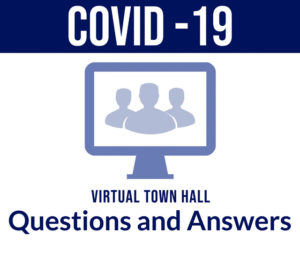Returning to school after summer break was once a normal and much anticipated annual occurrence. During the COVID-19 pandemic, many in the Kaiserslautern Military Community questioned what to expect for the 2020-2021 academic year.
DoDEA officials announced July 14 that schools will offer face-to-face instruction while also allowing those with health vulnerabilities or concerns an option to enroll in virtual school. Leaders from the Department of Defense Education Activity worked diligently to create a plan that meets health, safety and educational needs of students within the KMC.
In order to inform parents about what to expect when classes begin Aug. 24, DoDEA Europe-East Superintendent, Steve Sanchez, and the 86th Mission Support Group commander, Col. Robert Thompson, hosted a virtual town hall via the Ramstein Air Base Facebook page July 24.
Thompson opened by reminding local Army counterparts that Air Force and Army communities are interlocked. Information from the town hall is relevant to both services.
“This (return to school plan) has been a work in progress with close coordination from military leaders for quite some time,” said Sanchez.
Sanchez provided a glimpse of what life will be like in the new academic year. For those parents sending children to face-to-face instruction, each day will begin with a home health screening and temperature check.
“Parents will need to sign an acknowledgement that they will do a health screening on their child daily,” said Sanchez. “If your child isn’t feeling well or has any (flu-like) symptoms, please stay home. We are asking our staff to do the same for the well-being of everybody.”
Buses will be sanitized daily and bus riders must wear a face covering while at stops and during transit. Sanchez said DoDEA has purchased enough face coverings to provide two for each student and educator.
DoDEA has taken considerable measures to provide handwashing stations and maximize the physical distance between students. Changes include rearranged classrooms, grab-n-go lunches instead of serving trays and multiple lunch periods. Face coverings can be removed if students are at a six-foot distance, but must be worn when close to others or during transitions between classes.
Sanchez also provided information for families opting to keep students home.
“Virtual education will be done via DoDEA’s Virtual School, which has been teaching high school classes successfully for more than a decade,” said Sanchez. “Virtual School is not remote learning like what was done in the spring.”
While remote learning followed a typical day and bell schedule, students enrolled in Virtual School will take five classes. The curriculum is more “on demand” and self-paced with specific (weekly) deadlines. Families must commit to one semester if they elect to enroll in the Virtual School.
Some town hall viewers expressed concerns that students in Virtual School will take five classes while their high school peers in face-to-face instruction will take seven. Sanchez noted that in a virtual environment, five courses is the preferred course load for educational success.
“We can make exceptions for seniors who need to take additional classes in order to graduate, but this will be on a case-by-case basis,” said Sanchez.
Schools are asking parents to review materials on DoDEA’s website until the ‘Return to School’ page. Making a decision early helps schools forecast and plan their staffing needs. Families who PCS during the school year will have the option to select virtual or face-to-face instruction upon arrival.
Before signing off, Thompson encouraged parents with remaining questions to take advantage of the MSG’s School Liaison Office or reach out to squadron Key Spouses. SLOs are the link between parents and schools.
“Our SLOs are fantastic! They care about you, they care about the kids, and they care about what we do!” said Thompson.
The SLO can be contacted at DSN 480-2000 or commercial at 06371-47-2000.


